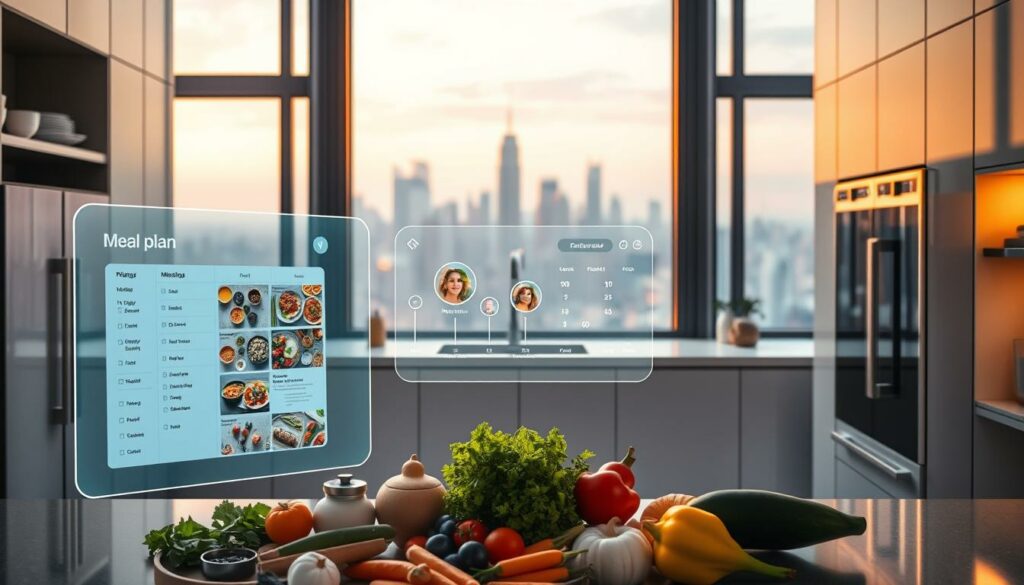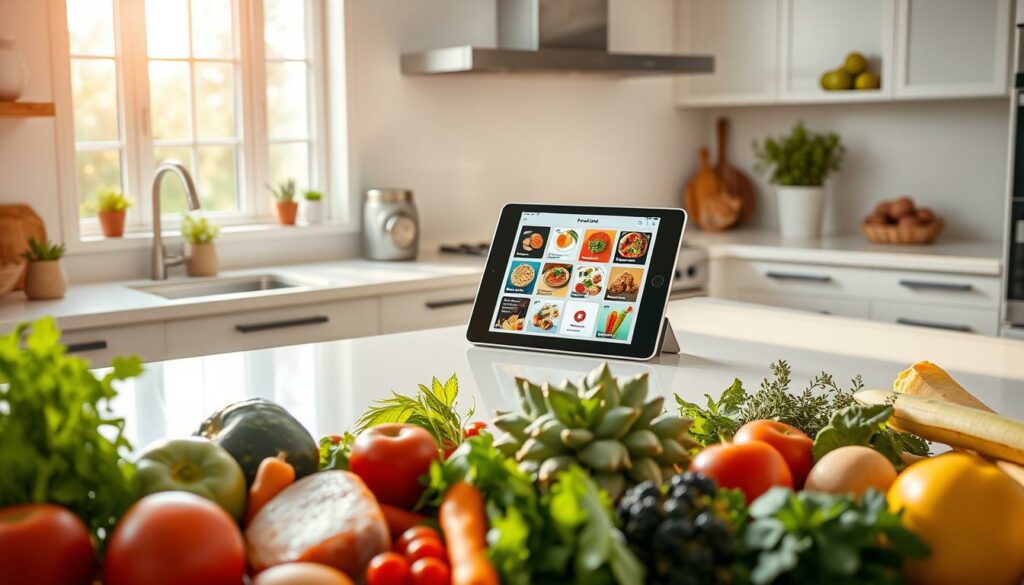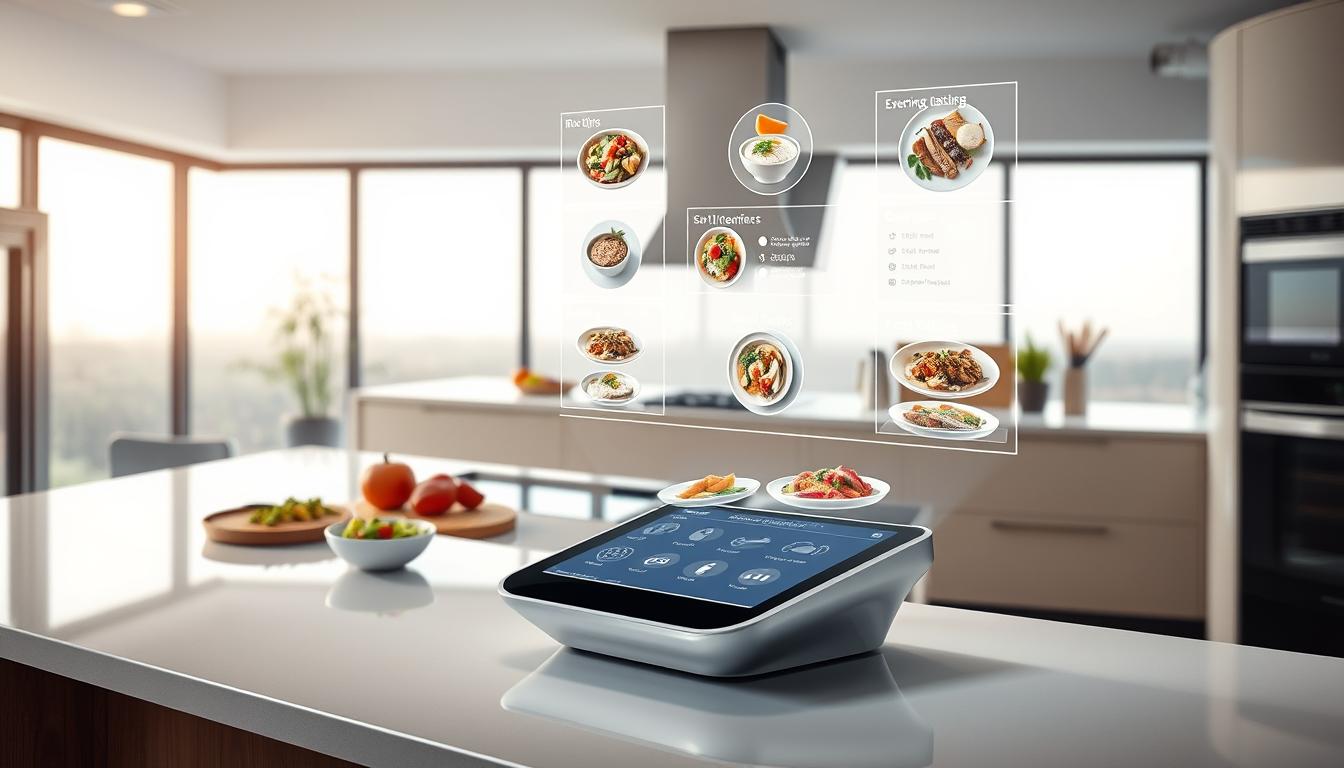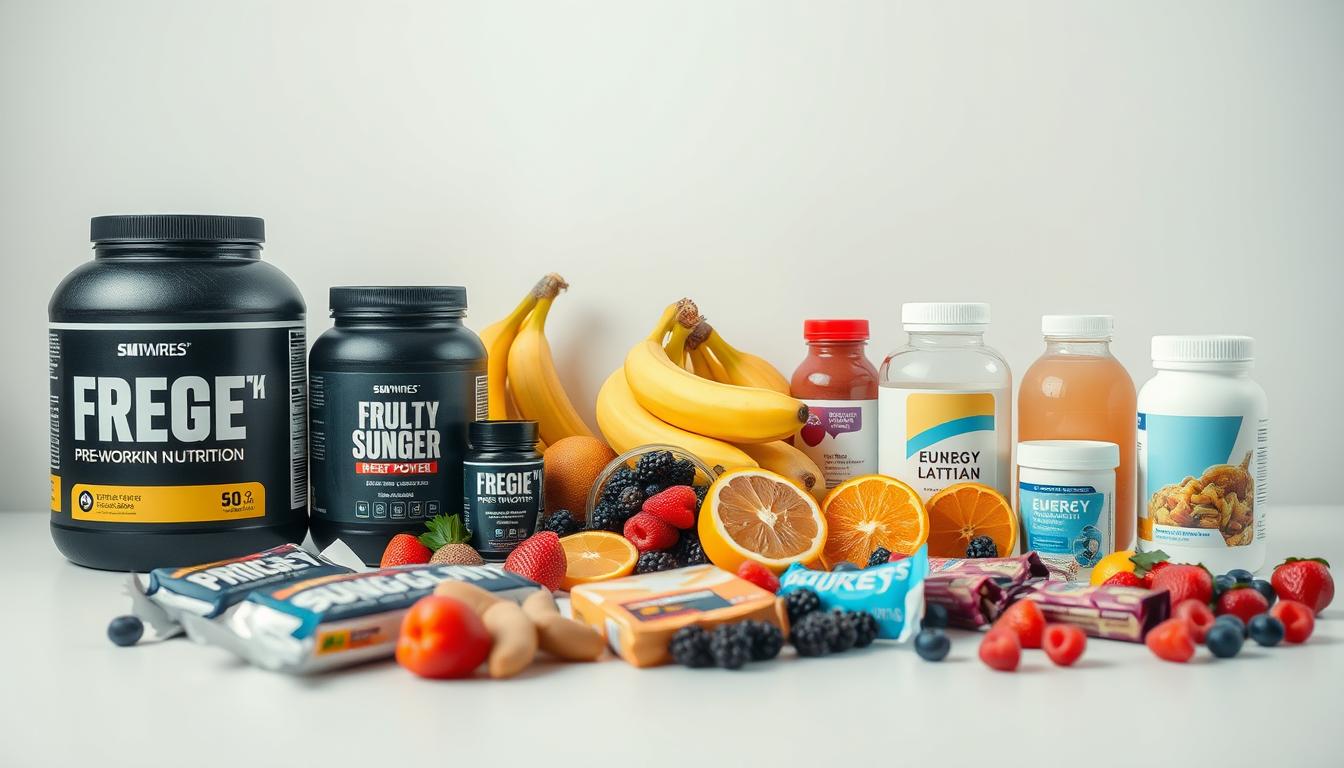Are you curious about the new wave of personalized nutrition? With AI technology, meal planning is now more tailored and efficient. But can you trust AI-generated meal plans to meet your dietary needs?
AI meal planning has changed how we think about nutrition. It offers customized plans based on your preferences, dietary restrictions, and health goals. However, like any new technology, it has its own set of benefits and drawbacks.
Exploring AI-generated meals is important. You need to know the advantages and potential pitfalls. This article will guide you through the rise of AI meal planning, its benefits, and what to watch out for.
Key Takeaways
- Understanding the basics of AI-generated meal plans
- Benefits of using AI for meal planning
- Potential drawbacks and limitations
- How to effectively use AI meal planning for your needs
- Tips for getting the most out of AI-generated meal plans
The Evolution of Meal Planning in the Digital Age
In today’s digital world, planning meals has become much easier and more fun. This change shows how technology and our habits have evolved together.
From Cookbooks to Apps: How Meal Planning Has Changed
Before, we used cookbooks and wrote down our shopping lists by hand. Now, digital tools have made meal planning a breeze. You can find apps that help you organize recipes, make shopping lists, and even buy groceries online.
A recent survey found a big jump in using digital tools for meal planning. Many apps now use AI to suggest meals just for you.
“The rise of meal planning apps has revolutionized the way people approach cooking and nutrition, making it easier to stick to dietary plans.” – Nutrition Expert
The Emergence of AI in Nutrition and Diet
AI has changed how we plan our meals and diets. It uses data to create plans that fit your health and taste. This means you get meals that are just right for you.
| Feature | Traditional Meal Planning | AI-Generated Meal Plans |
|---|---|---|
| Personalization | Limited to individual effort | Highly personalized based on data |
| Convenience | Time-consuming | Quick and efficient |

As AI gets better, it will play an even bigger role in meal planning. It will give us more detailed and personalized advice on what to eat.
What Are AI-Generated Meal Plans?
AI is changing how we plan our meals. AI-generated meal plans give you food ideas that fit your health goals and taste. They consider what you need, like vitamins and calories.
How AI Creates Personalized Meal Recommendations
AI looks at lots of data to suggest meals. It checks your health, what you like to eat, and your lifestyle. This helps make meal plans just for you. The ai meal prep benefits include less food waste and better nutrition.

Types of AI Meal Planning Tools Available Today
There are many AI meal planning tools out there. They meet different needs and tastes. You can find them in two main groups: subscription services and free apps.
Subscription-Based Platforms
Subscription services give you extra perks. They offer coaching, detailed nutrition info, and meal plans made just for you. Examples are PlateJoy and Mealime.
Free Apps and Services
Free tools like Yummly and Spoonacular help with meal planning. They suggest recipes and organize your meals. They’re a good start for beginners in AI meal planning.
| Feature | Subscription-Based | Free Services |
|---|---|---|
| Personalized Recommendations | Yes | Limited |
| Nutritional Analysis | Detailed | Basic |
| Cost | Monthly/Annual Fee | Free |
Thinking about are ai meal plans effective? Look at what tool fits your needs and likes best.
The Rise of AI-Generated Meal Plans: Should You Trust Them?
AI in nutrition is becoming more popular. It’s important to check if AI meal plans are trustworthy. As technology gets better, AI gives more tailored diet advice.
Current Market Trends in AI Nutrition
The demand for AI meal plans is skyrocketing. More people want health and wellness plans that fit them. This is driving the growth of AI nutrition tools.
Key players in the market are putting a lot of money into AI. They want to make their meal plans more accurate and personal.
Consumer Adoption Rates and Satisfaction
Most people like AI meal plans. They find them easy to use and tailored to their needs.
But, some users worry about the lack of human touch. They’re concerned about relying too much on algorithms for diet advice.
Scientific Backing Behind AI Nutritional Recommendations
Experts have mixed opinions on AI meal plans. Some studies support AI for nutrition advice. But, others say we need more research to be sure.
It’s key to look at where AI gets its data. Does it come from solid scientific research?
In summary, AI meal plans have their good points. But, we should be careful and understand their limits. When using AI for meal planning, it’s important to check if it’s based on solid science.
Benefits of AI Meal Planning
AI meal planning makes healthy eating easier and more fun. It creates plans that fit your diet, likes, and lifestyle. This way, eating well becomes simpler than ever.
Personalization Based on Dietary Needs and Preferences
AI tools look at what you need and like to make meal plans just for you. They handle special diets like vegan or gluten-free. A study in the Journal of the Academy of Nutrition and Dietetics shows these plans help you stick to your diet better.
Time and Cost Efficiency in Meal Preparation
AI meal planning saves you time and money. It makes shopping lists from what you already have. This way, you spend less on food and waste less.
Nutrition Optimization and Introducing Food Variety
AI meal planning makes sure your meals are balanced and varied. It introduces new foods and recipes. This keeps your meals interesting and full of nutrients.
| Aspect | Traditional Meal Planning | AI Meal Planning |
|---|---|---|
| Nutritional Balance | Often relies on general guidelines | Uses detailed nutritional data for personalization |
| Variety Introduction | Limited by personal knowledge and preferences | Explores a wide range of cuisines and ingredients |
| Time Efficiency | Can be time-consuming to plan and adjust | Automates planning and adjusts based on feedback |
Using AI for meal planning makes eating better, easier, and cheaper. As AI in meal planning grows, it will bring even more benefits to our health and lives.
Limitations and Concerns of AI Meal Plans
AI meal plans have many benefits, but they also have some concerns. It’s important to know these limitations before using AI for meal planning. This way, you can make smart choices about your diet.
Data Privacy and Security Issues
One big worry with AI meal plans is data privacy and security. When you use these tools, you share personal info like what you eat and health conditions. It’s key to make sure this data is safe.
Accuracy of Nutritional Recommendations
Another concern is how accurate AI meal plans are. AI uses lots of data to give advice, but it might not always get it right for you. This is because the data it uses might not cover your specific needs.
Lack of Human Intuition and Cultural Context
AI meal plans can’t replace the insight a human nutritionist or family member can offer. They might not get the cultural importance of certain foods or the unique tastes within a family.
| Concern | Description | Potential Impact |
|---|---|---|
| Data Privacy | Risk of personal data exposure | Identity theft, targeted marketing |
| Nutritional Accuracy | Limited by training data quality | Inaccurate dietary advice |
| Cultural Context | Lack of human intuition | Misunderstanding personal preferences |
Knowing these limitations helps you trust AI meal plans better. It lets you use them wisely and add your own judgment to their suggestions.
How to Evaluate the Reliability of an AI Meal Planner
When looking at an AI meal planner, there are important things to check. These details can greatly affect how useful it is in your daily life. It’s crucial to examine certain aspects to make sure you’re getting the best service.
Checking the Data Sources and Algorithms
The base of any AI meal planner is its data and algorithm. Make sure the service clearly shows where it gets its data and that it’s current and trustworthy. The algorithm should be advanced enough to handle different nutritional needs and dietary restrictions.
Looking for Nutritionist Involvement and Credentials
Having professional nutritionists involved can boost an AI meal planner’s credibility. See if the service has certified nutritionists or has worked with health experts to create their meal plans.
Reading User Reviews and Success Stories
User feedback and success stories offer insights into an AI meal planner’s effectiveness. Focus on reviews that talk about meeting dietary needs and preferences. Be cautious of services with too many positive reviews that seem fake.
Testing for Adaptability to Your Feedback
A good AI meal planner should adjust based on your feedback. Try giving feedback on the first meal plans and see how it changes. This shows if it can learn and tailor plans for you.
By carefully looking at these points, you can figure out if an AI meal planner is reliable and meets your nutritional needs. Are AI meal plans effective? Yes, they can be a great help in reaching your dietary goals when chosen well.
Step-by-Step Guide to Using AI Meal Plans Effectively
AI meal plans can change your diet for the better if you know how to use them. It’s important to learn how to fit these plans into your daily life.
Setting Up Your Profile with Accurate Information
The first step is to set up your profile. You need to give the AI system info about what you eat, your health goals, and what you like. Make sure your data is correct so the AI can give you good meal ideas.
Customizing Preferences and Dietary Restrictions
Next, customize your preferences and dietary needs. Tell the AI what foods you like and dislike, and any allergies or special diets you follow. Be specific so the AI can make meal plans just for you.
Reviewing and Adjusting Initial Recommendations
After the AI gives you a meal plan, check it out. See if it meets your needs and goals. If not, tell the AI so it can make better plans for you next time.
Implementing the Plan in Your Daily Routine
To get the best from your AI meal plan, follow it every day. Cook the meals suggested and keep track of how you’re doing. Sticking to it is important to see results.
Providing Feedback for Improved Future Recommendations
Lastly, give feedback to the AI. Tell it what you like and dislike about the meals. This helps the AI get better at suggesting meals that you’ll enjoy.
By following these steps, you can make the most of AI meal plans. As AI gets better, meal planning will become even more personalized and efficient. So, should you use AI meal plans? Yes, they can help you reach your health and nutrition goals if used right.
Integrating AI Meal Plans into Your Daily Life
AI in nutrition has made meal planning easier and more personal. To get the most from AI meal plans, learn how to fit them into your daily routine.
Creating a Sustainable Meal Planning Routine
Start by setting achievable goals for meal planning. Pick a day each week for planning and shopping. Consistency is key to making it a habit.
Combining AI Recommendations with Your Own Preferences
AI meal plans are great, but you should also add your own touch. Adjust AI suggestions to fit your taste, dietary needs, and cultural background. This mix of tech and personal taste makes meal planning fun and fitting for you.
Using AI for Grocery Shopping and Inventory Management
AI meal plans can also help with grocery shopping and keeping track of what you have. Many AI tools create shopping lists and manage your kitchen inventory. This saves time and cuts down on food waste.
| Benefits | AI Meal Planning | Traditional Meal Planning |
|---|---|---|
| Personalization | Highly personalized based on dietary needs and preferences | Limited personalization |
| Time Efficiency | Significantly reduces meal planning time | Time-consuming |
| Grocery Management | Can generate shopping lists and manage inventory | Manual list making |
By embracing these aspects, you can enjoy the ai meal prep benefits and make meal planning a sustainable and enjoyable part of your daily life.
Comparing AI Meal Plans with Professional Nutritionist Guidance
AI in nutrition is becoming more popular. It’s important to know the good and bad of AI meal plans versus getting advice from a nutritionist. Knowing the pros and cons of each can help you choose the best diet for you.
Cost-Benefit Analysis
Cost is a big factor when deciding between AI meal plans and a nutritionist. AI meal planning is often cheaper, with many services being free or low-cost. On the other hand, seeing a nutritionist can cost more but you get advice that fits your needs better.
| Service | Cost | Personalization Level |
|---|---|---|
| AI Meal Plans | $10-$30/month | High |
| Professional Nutritionist | $50-$100/session | Very High |
Complementary Approaches Rather Than Substitutes
Think of AI meal plans and nutritionist advice as working together. AI can be a good starting point. Then, a nutritionist can make detailed changes based on your progress and needs.
When to Consult a Human Expert Instead
AI meal plans are great, but sometimes you need a human touch. If you have special dietary needs or health issues, a nutritionist can offer tailored advice. They consider your unique situation.
The Future of AI in Meal Planning and Nutrition
AI is changing meal planning fast, making nutrition more personal. As tech gets better, AI will play a bigger part in planning meals and nutrition.
Emerging Technologies and Innovations
AI in meal planning is linked to new tech like machine learning and natural language processing. These tools help AI understand what we need and want in our diets. For example, AI can look at lots of data to suggest meals just for you.
Key innovations include:
- Advanced data analytics for better nutrition insights
- Integration of wearable technology for real-time health monitoring
- Enhanced user interfaces for easier meal planning
Integration with Smart Kitchen Appliances and Grocery Delivery
AI meal planning will soon work with smart kitchen gadgets and grocery delivery. Imagine an AI that plans meals, buys ingredients, and cooks with your appliances. This makes cooking healthy and easy.
| Feature | Benefit | Impact |
|---|---|---|
| Smart Appliance Integration | Streamlined cooking process | Increased efficiency in meal preparation |
| Grocery Delivery | Convenience and time-saving | More time for other activities |
| Personalized Meal Planning | Tailored nutrition | Improved health outcomes |
A nutrition expert says, “The future of nutrition is in personalized diets, and AI is leading this change.”
“The integration of AI in meal planning is a game-changer. It’s not just about convenience; it’s about making healthy eating a reality for everyone.”
Predictive Nutrition and Health Outcome Forecasting
AI is also improving predictive nutrition. It looks at health data and diet to predict health outcomes and suggest ways to prevent problems. This proactive approach helps avoid health issues early on.
The potential of AI in predictive nutrition is huge, with uses in:
- Preventive healthcare through dietary adjustments
- Personalized health planning based on genetic data
- Long-term health outcome prediction
As AI grows, its role in meal planning and nutrition will grow too. By using these new tools, you can get a more tailored and efficient diet.
Conclusion
When looking at meal planning, think about using AI meal plans. These tools give you personalized nutrition advice, making meal prep easier and improving your diet. But, it’s important to know their limits, like privacy issues and missing human touch.
By looking at the good and bad sides, you can use AI meal plans wisely. To get the best from them, make sure your profile is right, adjust your preferences, and give feedback. AI can be a big help in finding a healthy diet and better eating habits.
Whether to use AI meal plans is up to you. A smart mix of AI and your own choices can make meal planning better and more fun. This way, you can enjoy a healthier relationship with food.


